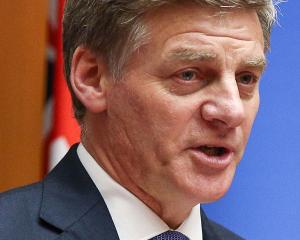Casting himself as some kind of self- anointed Harbinger of Economic Gloom and Doom, Winston Peters this week warned it was now only a question of time before New Zealand's currency reached dollar-for- dollar parity with its American equivalent.
Quelle horreur. To listen to Peters speaking in Parliament on his private member's Bill which sought to end the Reserve Bank's "myopic focus" on inflation targets, you could be excused thinking parity between the kiwi and Yankee dollars was unprecedented.
Admittedly, that may be so in recent history. But go back to 1979 and the two currencies were on a par.
Moreover, exporters coped.
They coped because they were actually better off than they had been six years earlier when the New Zealand dollar was nudging nearly $US1.50.
But memories quickly fade. The debate on the exchange rate is framed by the here and now. In the intervening 39 years, the New Zealand dollar slipped to a post-float low of just under US40c in late 2000 before clawing its way back up over the following decade.
Now close to 82c in value, the "high" dollar is undoubtedly hurting exporters. The dollar has previously hit similar highs only to ease back.
This time National seems to be copping a backlash, however.
That was evident in the party's behaviour in Parliament on Wednesday afternoon when National MPs filibustered on legislation higher up the order paper to dash Mr Peters' chances of making television's early evening news bulletins.
The New Zealand First leader's Bill - which would have required the Reserve Bank "to maintain an exchange rate that is conducive to real export growth and job creation" - was always going nowhere thanks to National and its Act and United Future allies.
But the measure's political cachet lay in it providing a very timely opportunity to thrash out the arguments for and against widening the Reserve Bank Act's objectives.
Labour, the Greens and NZ First argue that New Zealand no longer has an inflation problem. It has a jobs problem.
But those who want to see the Reserve Bank give more attention to the supposedly overvalued currency have to answer some questions - such as how high is too high and equally how low is too low?
And is it the role of the Reserve Bank to gamble millions of dollars on the foreign exchange markets to prop up exporters who rely on a low exchange rate rather than address inefficiencies in their workplaces?
Such questions are easily glossed over in Opposition. They are impossible to ignore once in Government.
That may explain why Mr Peters was a lion in Opposition in the 1990s when it came to promising to make the Reserve Bank take more cognisance of the exchange rate.
He turned into a lamb as Treasurer in the National-New Zealand First coalition in accepting a policy targets agreement with then Reserve Bank governor Don Brash which did not even mention the words "exchange rate". The only concession was mention of maintaining a stable general level of prices so that monetary policy could "make its maximum contribution to sustainable economic growth, employment and development opportunities".
Nothing changed. It was business as usual for the Reserve Bank.
What is different now?
The exchange rate has simply become a high-profile means by which Labour, the Greens and New Zealand First seek to supplant the prevailing economic orthodoxy.
For perhaps the first time in this Administration, the walls of National's economic fortress have been breached.
Even better from the Opposition's point of view, National can do precious little about it because it is against intervening in the foreign exchange market.
The broader battle lines are clear.
The Opposition knows that if National's economic orthodoxy is still the prevailing world view in 2014 - as it was in 2008 and 2011 - then Labour and its friends will struggle to win that year's election.
So the Opposition parties are seeking to turn the tables on National by proclaiming the economic orthodoxy of the past 30 years has run its course.
They say the global financial crisis and its bitter lingering recessionary after-taste has seen to that.
The time has instead come for a new, more interventionist economic paradigm.
Take the exchange rate, for example.
Once upon a time, a high exchange rate would be cause for congratulation rather than commiseration. It was the measure of a healthy, well-balanced and growing economy.
Labour argues everything has changed. The high New Zealand dollar simply reflects the cold hard fact that other countries are ruthlessly devaluing their currencies to provide some desperately needed stimulation for their economies.
The speculative foreign exchange market is consequently driving the kiwi even higher - and at the cost of jobs.
The latter is the other prong in Labour's strategy to loosen voters' attachment to economic orthodoxy.
Rather than debate job cuts across the board, Labour is trying to focus the debate on job losses in manufacturing.
It argues that a modern economy requires a manufacturing sector that is not solely consumed with just processing pastoral, fishing and forest products. It requires a skilled manufacturing sector that provides jobs for those who would otherwise flee to Australia.
Labour knows that weaning voters off economic orthodoxy is not going to happen overnight. While it has big-ticket items in the policy mix - a capital gains tax, lifting the age of entitlement to national superannuation and rock-solid adherence to a workplace-based savings scheme in the form of KiwiSaver - it has yet to show how these fit together in a coherent, easily comprehended economic plan.
For now, the basic message is that the current orthodoxy is not working.
However, voters must have confidence in whatever replaces it.
No surprises then that Labour eyes looked skywards when earlier this month the Greens' Russel Norman floated the idea of allowing the Reserve Bank to follow the American and British examples of "quantitative easing" to stimulate the economy.
This licence to print money was used by the central banks in those countries to signal that they would not allow their economies to slip into depression.
Unlike those central banks, the Reserve Bank here still has some leeway for cutting interest rates, thereby stimulating activity and easing buying pressure on the dollar without jeopardising inflation targets.
The last thing Labour wanted was for the economic debate to get sidetracked by quantitative easing which opponents would decry as at best the resurrection of Social Credit and "funny money"' and at worst raises the spectre of hyper-inflation and people being forced to carry their money around in wheelbarrows.
Economic orthodoxy will not go down without a fight.
Labour, the Greens and NZ First may have capitalised on a wildly fluctuating exchange rate, but there is a long way to go before they can claim any kind of victory.
• John Armstrong is The New Zealand Herald political correspondent.




